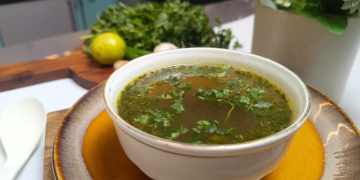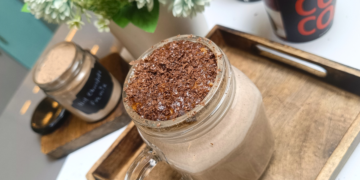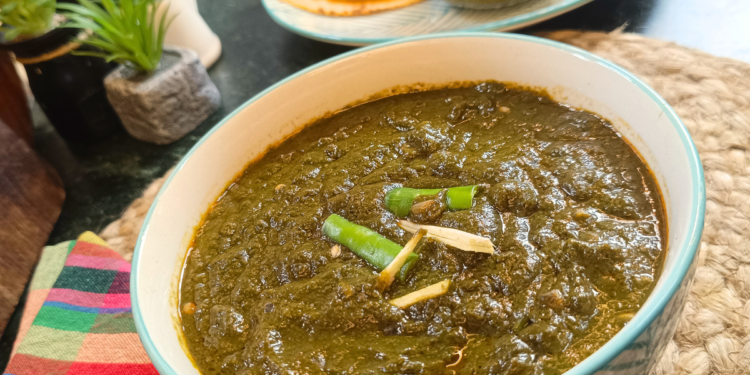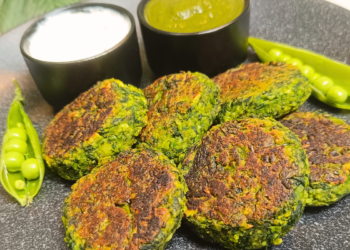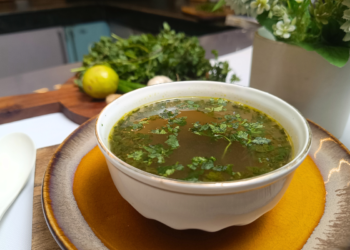Lohri is just around the corner! The fields are blooming with yellow mustard flowers, and the air is filled with festive excitement. What is Lohri without the traditional combo of Makki ki Roti and Sarson ka Saag?
This harvest festival celebrates the new crop, and there is no better way to enjoy it than with a bowl of warm, creamy Saag. As we get ready to light the bonfire and dance to Bhangra beats, let’s bring the true authentic Punjabi spirit to our kitchen. This recipe is simple, healthy, and the perfect way to make your Lohri celebration extra special.
About the Recipe
Sarson ka Saag is a classic winter delicacy originating from the Punjab region. It is not just a curry; it is a celebration of the winter harvest.
Traditional Saag is never made with just one green. It is a melange of seasonal leaves. While Sarson (Mustard Greens) provides the signature pungent and peppery base, it is balanced out with the mildness of Palak (Spinach) and the unique bitterness of Bathua and Methi (Fenugreek).
What makes this recipe special is the technique. Instead of pureeing the greens into a smooth paste, we grind them coarsely. This preserves the fibrous texture of the leaves. We also use Makki ka atta (cornmeal) to thicken the gravy, which gives the Saag a creamy, velvety body without using cream or cashews.
Taste and Texture
- Taste: The Saag has a rich, earthy taste. The mustard leaves have a slight sharpness (like radish or mustard sauce), which is balanced by the spinach and the aromatic ginger-garlic masala. The final ghee topping makes it smell wonderful.
- Texture: It is not smooth like soup. Authentic Saag has a grainy and coarse texture. You should feel small pieces of leaves when you eat it.
Why It Is Good for Winters
Eating Sarson ka Saag in winter isn’t just about tradition; it’s about staying healthy.
- Rich in Immunity Boosters: Mustard greens are loaded with Vitamin C and antioxidants, which help ward off colds and flu common in winter.
- Warming Effect: According to Ayurveda, mustard leaves have a natural “heat” (thermogenic) property. Consuming them helps keep the body warm from the inside during freezing temperatures.
- High in Fiber: The combination of bathua, methi, and sarson is extremely high in dietary fiber, which aids digestion and keeps gut health in check.
- Iron and Calcium: Bathua and spinach are excellent sources of iron, making this dish great for maintaining hemoglobin levels.
- Detoxification: These leafy greens act as natural detoxifiers, helping to cleanse the liver and blood.
Ingredients
- Sarson (Mustard Greens): The star ingredient that gives the dish its classic spicy kick and warmth.
- Palak (Spinach): Balances the bitterness of mustard leaves and gives a creamy texture.
- Methi & Bathua: These seasonal greens add a unique earthy flavor and are rich in nutrients.
- Gajar (Carrot): Adds a natural sweetness to balance the strong flavors.
- Makki ka Atta: Acts as a thickener. It makes the gravy creamy without adding cream.
- Ginger & Garlic: Provide a strong aroma and keep the body warm in winter.
- Mustard Oil: The traditional cooking fat that gives the authentic Punjabi taste.
- Onion & Tomato: Form the base of the masala and add a tangy-sweet balance.
- Ghee (Tadka): The finishing touch that adds richness and a wonderful aroma.
Serving Suggestions
The traditional and best way to serve Sarson ka Saag is with:
- Makki ki Roti: A flatbread made from corn flour, cooked on a griddle with ghee.
- Makkhan (White Butter): A fresh dollop on top of the hot Saag is non-negotiable for an authentic experience.
- Jaggery (Gur): A small piece of jaggery eaten alongside balances the slight bitterness of the greens.
- Pickle: A side of onion or mixed pickle adds a tangy kick.
Variations
- No Onion, No Garlic (Satvik): You can skip the onions and garlic. The flavor will be simpler, but the ginger and green chillies are enough to make it tasty.
- With Paneer: You can add cubes of paneer to the Saag during the last 5 minutes of simmering for a protein-rich variation.
- Bathua Substitute: If Bathua is not available in your region, you can replace it with more Palak or Methi.
Storing Suggestions
- Refrigerator: You can store cooked Saag in an airtight container in the refrigerator for up to 3–4 days.
- Freezer: Saag freezes exceptionally well. Portion it into freezer-safe bags or containers and freeze for up to 1–2 months. Thaw overnight in the fridge before reheating.
- Reheating: Reheat on a low flame, adding a splash of water only if it’s too dry. You can do a fresh tadka (ghee + ginger) on leftover Saag to freshen it up.
This Lohri, skip the restaurant food and enjoy the authentic taste of Punjab at home. Making Sarson ka Saag is easy and very satisfying. It is a healthy meal that fills your stomach and warms your heart.
Happy Lohri!
Print
Winter Special Sarson ka Saag
- Total Time: 55 minutes
- Yield: 3-4 1x
- Diet: Vegetarian
Description
Sarson ka Saag is a simple and comforting winter dish made with fresh seasonal greens like mustard leaves, spinach, methi, and bathua. Slowly cooked and lightly ground for a rustic texture, it is finished with a desi ghee tadka for rich flavour. Best enjoyed hot with makki ki roti, white butter, and a little salad, this dish is pure winter comfort.
Ingredients
For Boiling Greens
- 100 g sarson (mustard leaves), cleaned
- 50 g bathua
- 50 g methi
- 200 g palak
- 1 small gajar (carrot)
- ½ inch adrak
- 2 green chillies
- ½ tbsp salt
- 4 cups water
- 2 tbsp makki ka atta
- ⅓ cup boiled water (for grinding)
For Masala
- 4 tablespoon mustard oil
- 1 inch ginger, finely chopped
- 10–12 garlic cloves, finely chopped
- 2 green chillies, chopped
- 2 onions, chopped
- 1 tomato, chopped
- 1 tsp Kashmiri red chilli powder
- 1 tsp coriander powder
- 1 tsp salt
- ½ cup water or as needed
For Tadka
- 1–2 tbsp ghee
- A pinch of hing
- Ginger juliennes
- 1 slit green chilli
Instructions
Pressure-Cook the Greens
- In a pressure cooker, add sarson, bathua, methi, palak, chopped gajar, adrak, green chillies, salt, and 4 cups of water.
- Close the lid and cook for 1 whistle.
- Strain the mixture and reserve the strained water for later.
- Add the boiled greens to a grinding jar with 2 tbsp makki ka atta and 1/3 cup boiled/strained water.
- Grind into a coarse, thick paste (not fully smooth).
Prepare the Masala
- Heat 1 tbsp ghee/oil in a pan.
- Add chopped ginger and garlic — sauté till light golden.
- Add chopped green chillies and onions. Cook until soft and translucent.
- Add tomato, red chilli powder, coriander powder, and salt.
- Add ½ cup water, mix, cover, and cook till the masala becomes soft and mushy.
Cook the Saag + Masala
- Add the boiled saag paste to the masala.
- Add the reserved strained water to adjust consistency — traditionally slightly thick but pourable.
- Cover and cook on low heat for 10–12 minutes, stirring occasionally.
Prepare Tadka
- Heat ghee in a small pan.
- Add hing, ginger juliennes, and slit green chilli.
- Sauté for a few seconds until aromatic.
- Pour this hot tadka over the saag.
- Mix gently.
Serve Hot With Makki ki roti with butter, Sliced onions, Green chillies, Fresh white butter.
Notes
- Always wash greens 3–4 times. Sarson and bathua attract a lot of mud. Washing multiple times ensures the saag tastes clean and fresh.
- Palak helps reduce the bitter notes of sarson and methi. It also gives a creamy, smooth body to the saag.
- Don’t over-grind the greens. Saag tastes best when it’s coarse, not a smooth puree. A slightly rustic texture is authentic.
- Add makki ka atta for thickness. Makki ka atta prevents the saag from turning watery and helps it become creamy as it simmers.
- Do not skip the simmering. Even after mixing saag + masala, simmer for 10–12 minutes.This step develops the deep, earthy flavour.
- Tomato is optional but helpful. A little tomato balances bitterness and gives smoothness. Your quantity (1 tomato) is perfect.
- Adjust consistency with reserved water. Use the strained boiling water to thin the saag. Avoid adding plain water — the reserved water has nutrients + flavour.
- Add ghee for richness. A ghee tadka with hing, ginger, and chilli is key for aroma. You can add a second tadka on top before serving for extra flavour.
- Better next day! Sarson ka saag tastes even better after resting overnight — deeper, more blended flavors.
- Serve with makki ki roti + white butter. White butter (makkhan) is traditional and enhances the earthy saag beautifully.
- Prep Time: 25 minutes
- Cook Time: 30 minutes
- Category: Main Course, Winter
- Method: Cooking
- Cuisine: Punjabi

Sarson Ka Saag
- Total Time: 90 minutes
- Yield: 4-6 1x
Description
Sarson ka saag is a traditional Punjabi dish hailing from the northern region of India. It is a rich and flavorful preparation made primarily with mustard greens (sarson) and other leafy greens. This dish is commonly enjoyed during the winter season when mustard greens are abundant and at their peak.
Ingredients
- 500 grams mustard greens (sarson)
- 250 grams spinach leaves (palak)
- 100 grams bathua leaves (optional)
- 2 medium-sized onions, finely chopped
- 2 medium-sized tomatoes, finely chopped
- 4–5 green chilies, chopped (adjust according to spice preference)
- 1 tablespoon ginger-garlic paste
- 2 tablespoons maize flour (makki ka atta)
- 2 tablespoons ghee or clarified butter
- Salt to taste
- Red chili powder to taste
- Garam masala powder to taste
- A pinch of asafoetida (hing)
- Water as needed
Instructions
- Wash the mustard greens, spinach, and bathua leaves (if using) thoroughly under running water to remove any dirt or impurities. Chop them finely.
- In a large pot, add the chopped greens along with a pinch of salt and water. Cook them over medium heat until they become tender. This may take around 20-30 minutes. Once done, remove from heat and let it cool.
- Once cooled, blend the cooked greens into a coarse paste using a blender or food processor. Set aside.
- In a separate pan, heat ghee or clarified butter. Add the chopped onions and sauté until they turn golden brown.
- Add ginger-garlic paste and chopped green chilies to the pan. Cook for a few minutes until the raw aroma disappears.
- Add the chopped tomatoes and cook until they become soft and mushy.
- Now, add the blended greens paste to the pan and mix well. Cook for a few minutes, allowing the flavors to blend together.
- In a small bowl, mix the maize flour with some water to make a smooth paste. Add this paste to the pan and stir continuously to avoid any lumps from forming.
- Season the mixture with salt, red chili powder, garam masala powder, and a pinch of asafoetida (hing). Adjust the spices according to your taste preferences.
- Continue to cook the saag on low heat for another 20-30 minutes, stirring occasionally. This will help enhance the flavors and thicken the consistency.
- Once the saag reaches a desired consistency, remove it from heat.
- Serve sarson ka saag hot with makki ki roti (cornbread), a traditional accompaniment.
Notes
- Top the saag with a dollop of butter or ghee before serving for added richness.
- For extra smoky flavour, you can temper the saag with a tadka (tempering) of ghee, cumin seeds, and red chili powder.
- You can also add a small amount of fresh cream or yogurt to the saag for a creamy texture.
- Sarson ka saag tastes even better the next day as the flavours intensify, so consider making a larger batch and refrigerating leftovers.
- Garnish with finely chopped ginger and green chilies for added freshness and visual appeal.
- Prep Time: 30 minutes
- Cook Time: 60 minutes
- Category: Main course
- Cuisine: North Indian


